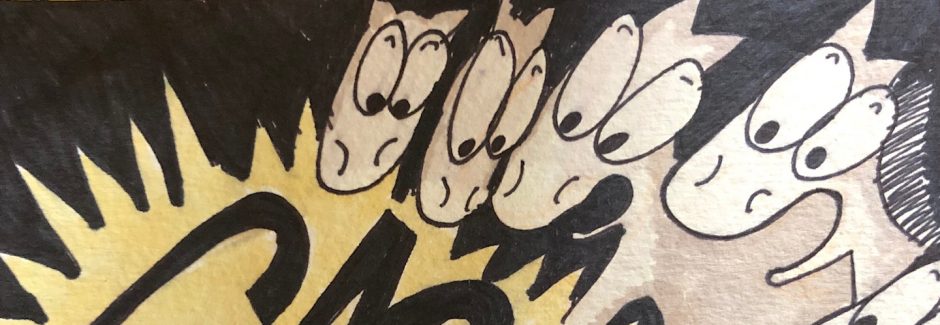Let’s take a moment to step back to the early 1800’s and the Atlantic Ocean. At that time the British navy was not exactly the first choice for most young men seeking a vocation. First off was the daunting prospect of spending at least two to three years jammed into a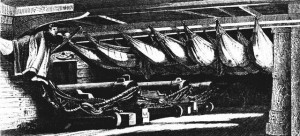 small wooden vessel designed to accommodate the maximum number of cannons with minimum room for the
small wooden vessel designed to accommodate the maximum number of cannons with minimum room for the fodder crew. Added to the package was bad food, poor wages, months of boredom interspersed with hours off unimaginable terror and, of course, the occasional light flogging.
It all posed a serious challenge to the His Royal’s HR team on recruitment day in the gymnasium.
And so press gangs were born. Impressment had been the standard method of gathering up conscripts for the Royal Navy dating back to the 1600’s. It reached new heights with the demands of the Napoleonic wars. The most significant protests at the turn of the 19th century, however, was from the new kid on the block: the former 13 colonies, hereinafter referred to as the Unites States of America.
Britain had the policy that if born a British citizen, always a British citizen; an adopted US citizenship could not wash one clean of the obligations due the mother country. As the wars with the Frenchies waged on, the British navy took to boarding American merchant 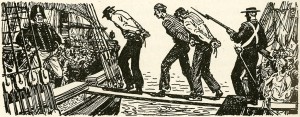 vessels with the same energetic recruitment procedures they employed on their own merchant ships.
vessels with the same energetic recruitment procedures they employed on their own merchant ships.
A British National found on British or American merchant vessels boarded by a British Naval search party could expect to be reminded of his duty to King, etc. with a complimentary set of chains, bruises, contusions and a healthy flogging for good measure. With hearty rations of rum, sodomy and a little more of the lash sure to follow.
It was infinitely preferable, however, to the treatment reserved for employees of His Royal Majesty’s taking unofficial leave on that same merchant ship. Some day I will tell you all about being flogged around the fleet.
There were a couple of well known instances where the damn Yankees proved reluctant to pull over to the curb despite signal flags and “ahoy there”s from the British ships. If the dash blasted (pardon my strong language ladies but it is a nautical tale, after all) American captains refused to stand to, it was necessary to resort to more a more emphatic signal by firing a round across their bow.
This usually provoked a spontaneous course change for the nearest friendly harbour. In notable instances, the plucky merchant returned fire and a battle ensued. Either way, great sport was enjoyed by all.
On June 22, 1807 a little dust up between the HMS Leopard and the USS Chesapeake has been given credit for leading to the War of 1812.
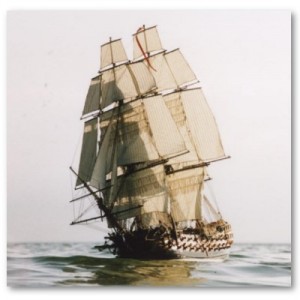 The Leopard was too small to serve as a ship of the line in battle. Like other fourth raters, she had the shallow draft necessary to patrol the Atlantic coast of North America. With a fully trained crew including marines, and 50 cannons, she still had a definite advantage over most merchant ships. The Chesapeake, a frigate with 38 guns, was loaded with cargo and unable to clear her decks in time when the British ship hove into view.
The Leopard was too small to serve as a ship of the line in battle. Like other fourth raters, she had the shallow draft necessary to patrol the Atlantic coast of North America. With a fully trained crew including marines, and 50 cannons, she still had a definite advantage over most merchant ships. The Chesapeake, a frigate with 38 guns, was loaded with cargo and unable to clear her decks in time when the British ship hove into view.
Captain Salusbury Pryce Humphreys: “I say, Chesapeake, we seem to be short a few sailors and one of the chaps here is pretty sure a few of his chums mentioned they might be crewing for your team now. Mind if we pop over and take a quick look?”
Commodore James Barron: “No”
Captain Salusbury Pryce Humphreys: “No, you don’t have any of our lads aboard or no, you won’t let us check?”
Commodore James Barron : “No, go away.”
Captain Salusbury Pryce Humphreys: “you’re sure? Absolutely sure”
Commodore James Barron : “YES! Bugger off!”
Captain Salusbury Pryce Humphreys : “In that case: FIRE!!!“
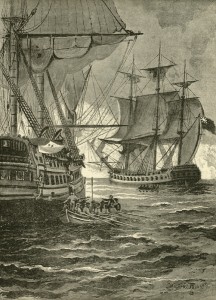 A few broadsides from the Leopard and a single shot from the Chesapeake later Captain Humphreys conveyed his compliments to Barron on a jolly good effort, sorry about the mess, and carted off 4 deserters from the British navy.
A few broadsides from the Leopard and a single shot from the Chesapeake later Captain Humphreys conveyed his compliments to Barron on a jolly good effort, sorry about the mess, and carted off 4 deserters from the British navy.
Some people think Americans were outraged at Britain insisting U.S. citizenship did not erase British born nationality. They weren’t. In fact a similar principle is enshrined in the United States Constitution.
On the other hand, it certainly didn’t reduce anti-British feelings in the United States. Young politicians building their careers found a lot of lumber in the shattered hull of the Chesapeake. They became the first Hawks to flap into US Congressional history.
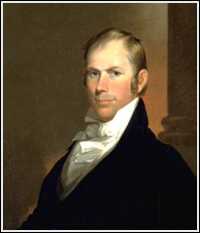 Henry Clay, the leader of the rump, used every opportunity to speak out on the need for a war to liberate all North America from the shackles of English monarchy.
Henry Clay, the leader of the rump, used every opportunity to speak out on the need for a war to liberate all North America from the shackles of English monarchy.
Whether those poor souls to the north wanted liberation or not.
